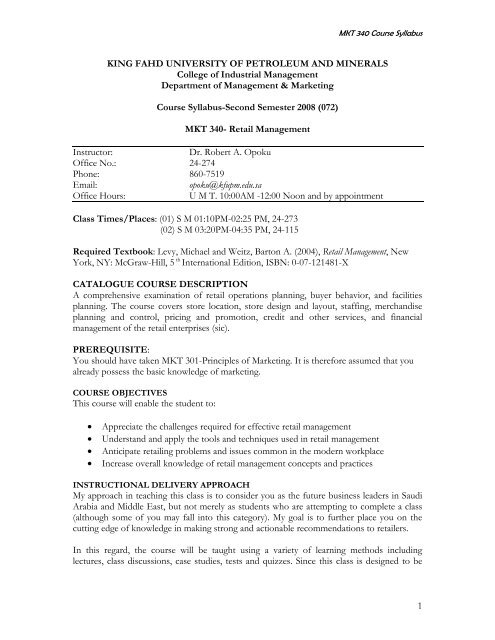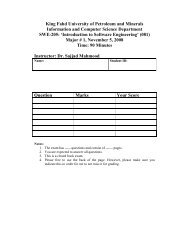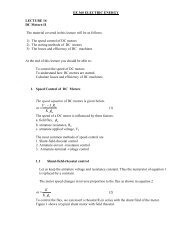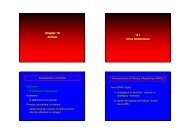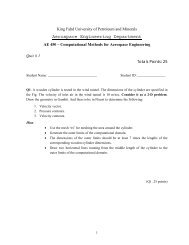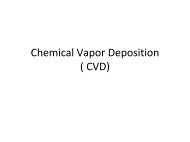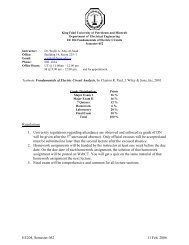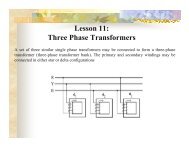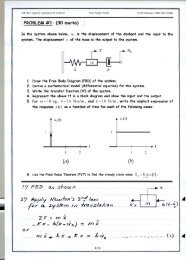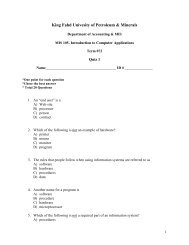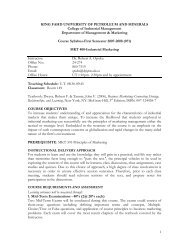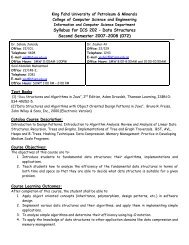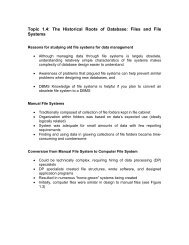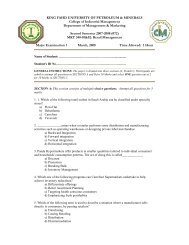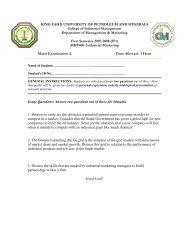Syllabus (pdf) - KFUPM Open Courseware - King Fahd University of ...
Syllabus (pdf) - KFUPM Open Courseware - King Fahd University of ...
Syllabus (pdf) - KFUPM Open Courseware - King Fahd University of ...
You also want an ePaper? Increase the reach of your titles
YUMPU automatically turns print PDFs into web optimized ePapers that Google loves.
MKT 340 Course <strong>Syllabus</strong><br />
KING FAHD UNIVERSITY OF PETROLEUM AND MINERALS<br />
College <strong>of</strong> Industrial Management<br />
Department <strong>of</strong> Management & Marketing<br />
Course <strong>Syllabus</strong>-Second Semester 2008 (072)<br />
MKT 340- Retail Management<br />
Instructor:<br />
Dr. Robert A. Opoku<br />
Office No.: 24-274<br />
Phone: 860-7519<br />
Email:<br />
opoku@kfupm.edu.sa<br />
Office Hours:<br />
U M T. 10:00AM -12:00 Noon and by appointment<br />
Class Times/Places: (01) S M 01:10PM-02:25 PM, 24-273<br />
(02) S M 03:20PM-04:35 PM, 24-115<br />
Required Textbook: Levy, Michael and Weitz, Barton A. (2004), Retail Management, New<br />
York, NY: McGraw-Hill, 5 th International Edition, ISBN: 0-07-121481-X<br />
CATALOGUE COURSE DESCRIPTION<br />
A comprehensive examination <strong>of</strong> retail operations planning, buyer behavior, and facilities<br />
planning. The course covers store location, store design and layout, staffing, merchandise<br />
planning and control, pricing and promotion, credit and other services, and financial<br />
management <strong>of</strong> the retail enterprises (sic).<br />
PREREQUISITE:<br />
You should have taken MKT 301-Principles <strong>of</strong> Marketing. It is therefore assumed that you<br />
already possess the basic knowledge <strong>of</strong> marketing.<br />
COURSE OBJECTIVES<br />
This course will enable the student to:<br />
• Appreciate the challenges required for effective retail management<br />
• Understand and apply the tools and techniques used in retail management<br />
• Anticipate retailing problems and issues common in the modern workplace<br />
• Increase overall knowledge <strong>of</strong> retail management concepts and practices<br />
INSTRUCTIONAL DELIVERY APPROACH<br />
My approach in teaching this class is to consider you as the future business leaders in Saudi<br />
Arabia and Middle East, but not merely as students who are attempting to complete a class<br />
(although some <strong>of</strong> you may fall into this category). My goal is to further place you on the<br />
cutting edge <strong>of</strong> knowledge in making strong and actionable recommendations to retailers.<br />
In this regard, the course will be taught using a variety <strong>of</strong> learning methods including<br />
lectures, class discussions, case studies, tests and quizzes. Since this class is designed to be<br />
1
MKT 340 Course <strong>Syllabus</strong><br />
practical, it would also be good to hear from people who are currently on the "frontlines" <strong>of</strong><br />
retailing.<br />
Due to the choice <strong>of</strong> teaching approaches above, a high degree <strong>of</strong> class involvement is<br />
necessary in order to ensure effective session outcomes. Therefore, prior to each class<br />
meeting, students should read relevant sections <strong>of</strong> the text, and prepare notes for<br />
participation in the discussions.<br />
COURSE REQUIREMENTS AND ASSESSMENT<br />
Learning outcomes will be measured through:<br />
1. Mid-Term Examinations - 40% (2@ 20% each)<br />
Two Mid-Term Exams will be announced and written for this course. The exams may<br />
consist <strong>of</strong> short-essay questions including defining important terms and concepts, multiple<br />
choice/true or false questions and application <strong>of</strong> course principles to business marketing<br />
problems. Each exam will cover the most recent chapters <strong>of</strong> the textbook.<br />
2. Quizzes – 10% (2 @5% each)<br />
Two (2) quizzes, worth 5% each, will be announced and administered during the semester.<br />
See course schedule for specific quiz dates. Quizzes could comprise <strong>of</strong> short answer/essays<br />
questions based on lectures and the textbook.<br />
3. Homework -6% (3 @ 2% each)<br />
Three (3) home assignments, worth 2% each will be announced and deployed during the<br />
semester. For several topics that will pop up in the class, homework problems, cases,<br />
readings, or visits to local retailers will be assigned individually. While I will not grade every<br />
detail <strong>of</strong> these assignments, they are required and you will receive credit for completing<br />
them.<br />
4. Group Project/Assignment- 14% (12% for final report and 2% for presentation)<br />
Teams will be formed not to exceed five (5) team members. However, final course<br />
enrolments will determine team size. Each group will be required to produce a final report<br />
on retail management activity. The group project output should consist <strong>of</strong> a 20 minute<br />
formal presentation and a report on a retail anthropology project. The class will have 10<br />
minutes for questions and contributions. Details <strong>of</strong> the project are as follows:<br />
i) This assignment requires you to conduct some retail investigation in the field. Pr<strong>of</strong>essional<br />
retail analysts <strong>of</strong>ten hire consulting firms to conduct studies that look at how consumers act<br />
and move in store settings. This is called “Retail Anthropology.” There are several issues<br />
that can help retailers make sure that their store design is optimized for their customers. You<br />
have to look at three specific ones: customer traffic flow, crowdedness, and<br />
accessibility. You will compare three retailers on these attributes. For this exercise, use<br />
simple rating scales from 1-10, where a “10” is best and “1 “is worst. Make a chart to<br />
summarize your findings.<br />
a. Visit three retail stores in an industry that interests you, such as department stores,<br />
discount stores, clothing stores, hardware stores, electronics stores, shoe stores, etc.<br />
Describe the industry, the three stores you picked, and tell why you selected each. Please<br />
choose a specific product category, such as shoes, within department or discount stores.<br />
2
MKT 340 Course <strong>Syllabus</strong><br />
b. Customer traffic flow: In each store, first watch how people move through the store. Do<br />
they follow similar paths? Are they attracted by certain displays or areas <strong>of</strong> the stores? Is the<br />
traffic flow efficient?<br />
c. Secondly, compare how crowded each store is. Are the aisles wider in one store versus the<br />
other? Do customers get in each other’s way?<br />
d. Finally, are all the stores equally accessible to people with disabilities? Do they have:<br />
automatic doors, ramps, handicapped accessible restrooms, toilets, fitting rooms (if<br />
applicable), checkout counters? Are displays accessible to people in wheelchairs?<br />
e. Briefly discuss your findings. Were there patterns in the ways that customers<br />
behaved? Were certain stores “better” than others? What would you recommend if you<br />
were a consultant?<br />
f. Could the stores you visited use e-commerce to improve in these three areas?<br />
ii) The team is required to produce an approximate 5-10 page report covering all points<br />
above and below, plus references and appendices covering all the research and notes that<br />
stand behind the recommendations and suggestions.<br />
N.B.: Students may be asked to evaluate their group members for their contribution<br />
to the project.<br />
5. Final Examination (30%)<br />
The final examination will be based on all topics covered (in class) during the term, with<br />
emphasis on the latter part <strong>of</strong> the course. It will be primarily multiple-choice questions but<br />
may include short answer questions or a short case. Further details <strong>of</strong> the examination<br />
format will be given later in the course.<br />
GRADING SCALE<br />
This will conform to the approved <strong>University</strong> grading scale (see the Undergraduate Bulletin<br />
2006-2009, pp. 45). However, I will work hard to create tests that are challenging but fair.<br />
WHAT IS EXPECTED FROM STUDENTS<br />
Your presence in class is essential to your ability to understand and apply the material<br />
covered in this course. <strong>University</strong> regulations on attendance will be strictly enforced (see<br />
page 38 <strong>of</strong> the Undergraduate Bulletin 2006-2009). Therefore, treat this class as you<br />
would to any other pr<strong>of</strong>essional obligation. No lateness will be tolerated. All mobile<br />
phones should be switched <strong>of</strong>f during classes. Any effort to gain an advantage not<br />
given to all students is dishonest whether or not the effort is successful. In this<br />
regard, any student caught cheating will attract ‘F’ for the course. Remember too that,<br />
each student deserves a classroom environment that makes it possible to concentrate and<br />
learn.<br />
You can ask for feedback on your performance at any time by phone, in person, or by<br />
email.<br />
3
MKT 340 Course <strong>Syllabus</strong><br />
TENTATIVE CLASS SCHEDULE<br />
Meeting<br />
Chapter/Topic or Responsibility<br />
1 (Feb 16) Course Introduction<br />
2 Ch 1 The World <strong>of</strong> Retailing<br />
3 Ch 2 Types <strong>of</strong> Retailers<br />
4 Ch 3 Multi Channel Retailing-A view into the future<br />
5 Ch 4 Customer Buying Behavior<br />
6 First Quiz ( March 3, 2008)<br />
7 Ch 5 Retail Market Strategy<br />
8 Ch 6 Financial Strategy<br />
9 Case Analysis or Guest Speaker<br />
10 Ch 7 Retail Locations<br />
11 Ch 8 Site Selection<br />
12 First Major ( March 24, 2008)<br />
13 Ch 9 Human Resource Management<br />
14 Ch 10 Information Systems and Supply Chain Management<br />
15 Ch 11 Customer Relationship Management<br />
16 Ch 12 Planning Merchandise Assortments<br />
12-16 April, 2008 Mid-Term Vacation<br />
17 Quiz 2 (April 19, 2008)<br />
18 Ch 13 Buying Systems<br />
19 Ch 14 Buying Merchandise<br />
20 Ch 15 Pricing<br />
21 Ch 16 Retail Communications<br />
22 Second Major Exams (May 5, 2008)<br />
23 Ch 17 Managing the Store<br />
24 Ch 18 Store Layout, Design, and Visual Merchandising<br />
25 Ch 19 Customer Service<br />
26 Case Analyses/Final Group Report Due on May 19, 2008<br />
27 Group Presentations<br />
28 Group Presentations<br />
29 Group Presentations<br />
30 Group Presentations/Course Review<br />
31 (7-18 June, 2008) Final Examinations<br />
N.B: Mid-Term Examinations and Quizzes will be held in the respective lecture rooms.<br />
Any changes in examination venues and schedules will be duly communicated to students.<br />
4


